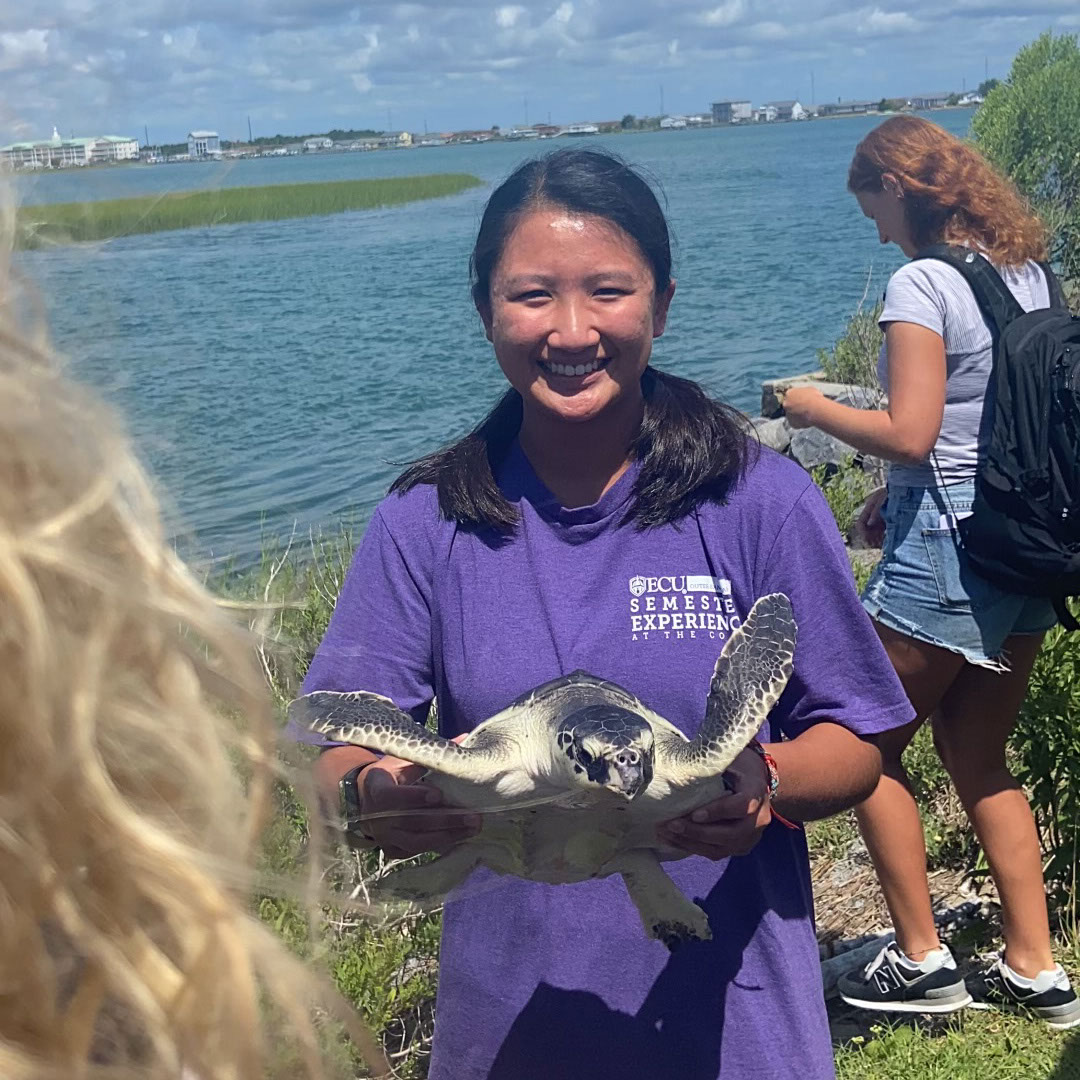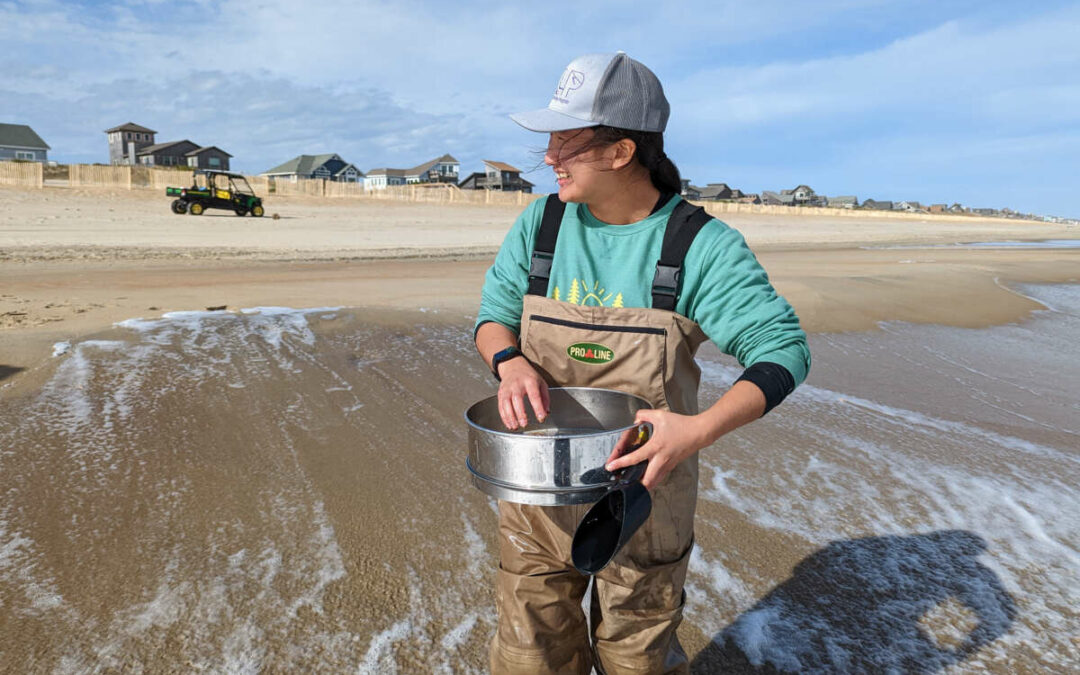For some students, the Semester Experience at the Coast is alluring simply because of the space in which it takes place. For others, it offers a change of pace from the Greenville campus. But better yet, for students like Christine Chan, the program opens doors to the once unimaginable.
Now a rising Honors College junior, Chan entered the Semester Experience at the Coast as a second-semester freshman. As a biology and environmental studies double major and coastal and marine studies minor, the coastal-focused program, which takes place on the ECU Outer Banks Campus, immediately drew her in. During her time on Roanoke Island, Chan made long-lasting connections with her professors and even interned in the Coastal Studies Institute’s Marine Geochemistry and Coastal Dynamics Lab.
Chan only spent one semester in 2022 at CSI, but she credits her experiences there, plus her lifelong fascination with the ocean, for shaping her college career path since that spring semester in 2022. Through her internship studying the effects of beach nourishment on sea turtle nesting in Pea Island National Wildlife Refuge, she gained hands-on field, lab, and data analysis experience. Chan is thankful for those opportunities, stating, “I feel very lucky to have gotten that experience as a freshman, especially since I came in with no prior experience. Everyone at CSI was really helpful with getting me started and teaching me the basics of research.”

Her exposure to research and hands-on coastal science led her to apply for a Research Experience for Undergraduates (REU) program at the Duke University Marine Lab in Beaufort, NC. Her project there included monitoring loggerhead nesting activity at Hammocks Beach State Park and researching the relationship between clutch size and carapace size. Between her time at CSI and at Duke, Chan realized a career in marine science could be attainable, and that she had many professors and mentors who would support her along the way.
As if her first year in college was not exciting enough, Chan spent this spring abroad in Costa Rica. Earlier this year, she was also selected for the highly competitive NOAA Hollings Scholar program and for another REU opportunity, this time at the University of Delaware.
At the University of Delaware, Chan will work on a project that examines the effects of microplastics on estuarine shrimp, amphipods, and other invertebrates. She sees many parallels between the ecosystems and estuaries of Delaware and North Carolina.
“After taking more classes this year, I feel I’m more interested in estuaries and invertebrates- both of which support most marine life. The program at the University of Delaware had sites nearby where I could easily gain experience with that type of field work,” says Chan.
Her time as a Hollings Scholar only officially just began with orientation in May. This winter she will have a few site and office visits to help as she and her mentors decide on the best placement for an internship at a NOAA branch during Summer 2024.
Chan, only two years into her higher education career, has already accomplished so much and has even more to look forward to in the seasons to come. While her mentors at the coast are not at all surprised given her drive and determination, they are still impressed with her strides as a young scientist.
“Christine came to the coast with such a great attitude, ready to learn more, engage in research, and use the time and opportunity at CSI to gain as much experience as she could,” shared Integrated Coastal Programs Dean Dr. Reide Corbett.
“She really flourished in this hands-on, experiential program. Certainly, we can’t take credit for all she has accomplished, and the list is long. However, we purposefully designed this program to give our undergraduate students an opportunity to not simply take classes but get real research experiences and explore coastal opportunities through the lens of natural and social scientists. Christine took the opportunity and ran with it, demonstrating the significance of programs like the Semester Experience at the Coast for making a positive difference in a student’s educational path.”
To other budding biologists and those interested in research, she offers the following advice.
“Always be willing to try new things and put yourself in situations you know nothing about. Truly, people won’t think you are useless if you are eager to learn. They want to help and see you succeed. It’s okay to be new.”
The preceding article first appeared in the Spring 2023 edition of Integrated Coastal Program’s seasonal newsletter CoastLines.



 Based at the Coastal Studies Institute (CSI), the North Carolina Renewable Ocean Energy Program (NCROEP) advances inter-disciplinary marine energy solutions across UNC System partner colleges of engineering at NC State University, UNC Charlotte, and NC A&T University. Click on the links below for more information.
Based at the Coastal Studies Institute (CSI), the North Carolina Renewable Ocean Energy Program (NCROEP) advances inter-disciplinary marine energy solutions across UNC System partner colleges of engineering at NC State University, UNC Charlotte, and NC A&T University. Click on the links below for more information. ECU's Integrated Coastal Programs (ECU ICP) is a leader in coastal and marine research, education, and engagement. ECU ICP includes the Coastal Studies Institute, ECU's Department of Coastal Studies, and ECU Diving and Water Safety.
ECU's Integrated Coastal Programs (ECU ICP) is a leader in coastal and marine research, education, and engagement. ECU ICP includes the Coastal Studies Institute, ECU's Department of Coastal Studies, and ECU Diving and Water Safety. The ECU Outer Banks campus is home to the Coastal Studies Institute.
The ECU Outer Banks campus is home to the Coastal Studies Institute.

